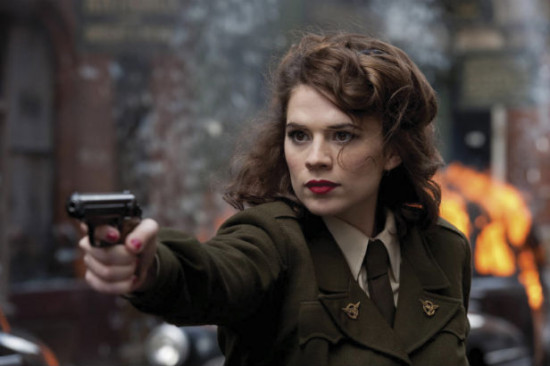
It appears that both ABC-TV and Marvel Studios are surprised and somewhat dismayed by the poor ratings garnered by the Captain America spinoff series Agent Carter, starring Hayley Atwell as an espionage action hero during World War II. The ABC and Marvel execs are putting on a brave face, according to reports, but the show’s numbers have not been good so far, as Entertainment Weekly reports:
Despite strong-ish reviews, the period action drama debuted to semi-soft numbers last week, then dropped notably this week for its second episode—though there is still more DVR playback data to come. . . .
[On Tuesday, week two of the show,] Agent Carter had 5.1 million [viewers] and a 1.5 rating among adults 18-49. For a new, lavishly produced drama series based on a known brand at 9 p.m., that’s considered a low next-day number. Last year ABC had episodes of The Goldbergs and Trophy Wife in the slot, which had a 1.4 rating. But on the other hand, it’s increasingly difficult to judge TV shows so early—Agent Carter‘s premiere has already grown to a 2.7 rating with DVR playback.
A 2.7 rating is not catastrophic, but it’s probably too low to sustain an expensive show set in a historical period. Meanwhile, the top show in that time slot, NCIS: New Orleans, drew more than three times as many viewers as Agent Carter‘s 5.1 million, with 16.39 million viewers live plus same day.
Agent Carter was billed from the start as a seven-week, limited-run series, so cancellation is not a concern, but both ABC and Marvel had hope that it would catch on and be brought back next year. Unless the ratings firm up, that is unlikely.
What went wrong with Agent Carter seems pretty clear to me. On the plus side, the show had terrific production values, a serviceable story line, an interesting and currently underused historical setting, eye-catching locations and clothing fashions, and lots of action. Standard-issue plot complications marred the story but probably didn’t do much harm, especially for younger audiences.
What killed the show for me, and, I suspect, many other viewers, was the producers’ decision to make the central character so unappealing. The protagonist, Agent Peggy Carter, is angry and feeling insulted through much of the pilot episode. Stuck doing routine office work for a fictional government agency, the Strategic Science Reserve, she continually encounters sexism, as male colleagues belittle her and assume that she is less intelligent and skilled than they.
As a result, Carter is continually in a snit, except when bantering with Edwin Jarvis, butler to Howard Stark and an ally to her. Those moments are relatively few, unfortunately, and as a result we see Carter continually being harassed by ill-mannered men, pretty much everywhere she goes.
This, it should be noted, is not true to life as it was lived in the 1940s, when manners were much better than they are today. Certainly there were boors and ruffians knocking about in those days, to be sure, just as there are today, but the great majority of people were basically decent, as also remains true today even as manners have eroded in recent decades.
Thus one gets the sense that the show’s writers are perverting history in order to make things more difficult for Agent Carter so that she will strike us as that much more heroic for overcoming such a plethora of difficulties. It is both unnecessary and off-putting, especially because Carter responds to these difficulties with anger and peevishness instead of aplomb.
In addition to all of this, Carter is mourning the (apparent) loss of Steve Rogers, aka Captain America. In short, her life is intolerably dreary.
All of this gloom, doom, and sexism ruins the tone of the show and distracts attention from the real story, which deals with a theft of what are now called weapons of mass destruction. When the viewer’s attention and concern should be on the possibility that thousands or millions of people might be killed by a mob of evildoers, Agent Carter is fending off insults and delivering knockout punches to impolite men. There is a serious lack of perspective evident here.
That’s the real reason the show is having problems. The first rule of television is that success depends on presenting people whom the viewer wants to invite into their home each week. It is true that some pay-cable shows do well with less-appealing protagonists, but typically even those shows have one or two characters whom the viewer can root for and enjoy watching.
The problem with Agent Carter, alas, is Agent Carter. She’s trying hard to do the right thing with her life, but it’s just too tough of a slog for the viewer to watch her fight off not only sinister terror-crime organizations but also rude colleagues and lounge lizards. It’s possible that the tone of the show will change over time, though it seems unlikely that the pilot would be so very different from the rest of the series. In the meantime, the show’s dismal tone and lack of a winsome major character seem likely to limit its audience appeal.

Spot-on, Lars, without even seeing the show!
I decided early on to give this one wide berth. I know I’m a dinosaur, but I’m sick to death of Amazons, unless they’re wearing a Wonder Woman suit and as winsome as Lynda Carter. Which this woman clearly is not.